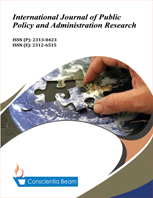Effects of government electronic service quality on citizen satisfaction with integrated service delivery in urban areas
DOI:
https://doi.org/10.18488/74.v10i1.3293Abstract
In the effort to achieve good and effective public services to gain public satisfaction and trust, the use of public electronic services (e-services) is expected to improve service quality. Public e-services offer better options for processing digital data. With increasing internet access, the use of e-services as a vehicle for delivering various public services is a promising development in the public sector. By maintaining and improving service quality, especially in the public sector, the use of internet/online services or public e-services will make users feel more satisfied and increase public trust. This study aims to determine the effect of electronic service quality on citizen satisfaction with public e-services. A quantitative research methodology was adopted. Data was collected by distributing online questionnaires to users of public e-service applications, totaling 150 respondents in Bandung, Indonesia. The sampling technique used was a purposive, non-probability-based sampling method. The data analysis technique was Structural Equation Modeling (SEM) using Smart software. The test results show that information quality, data security, and data privacy have a significant effect on e-service quality, which, in turn, has implications for citizen satisfaction. Based on the results of this study, we advise public e-services institutions to maintain and improve the quality of e-services by improving information quality, data security, and data privacy to increase user trust in public e-services.

